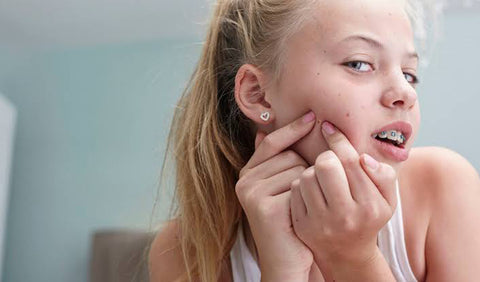Acne is so common that it is considered a normal part of puberty. But knowing that doesn't always make things easier if you have a large pimple on your face.
To understand the causes of teenage acne we first have to understand the meaning of acne. Blackheads, whiteheads, pimples, and cysts are just a few of the different types of bumps that can appear on the skin as a result of acne. Because of the hormone changes associated with puberty, teens often develop acne.
It's more likely that you will develop acne if your parents did when they were teenagers. However, by the time most people are out of their teens, their acne has virtually disappeared. Acne vulgaris, which means "the common type," is the kind of acne that affects a lot of teenagers. It typically manifests on the face, neck, shoulders, upper back, and chest.
Causes of acne
Sebaceous glands, also known as oil glands, are found in the hair follicles or pores of your skin. These glands produce sebum, an oil that moisturizes your skin and hair sebum.
The sebaceous glands typically produce the ideal quantity of sebum. However, hormones cause the sebaceous glands to produce more sebum as the body starts to mature and develop.
Too much sebum and too many dead skin cells can clog pores. Once trapped inside the pores, particularly bacterial acnes, can grow.

Types of acne
- A whitehead is a pore that becomes clogged, closes, and protrudes out from the skin as a result of swelling and redness, which is the beginning of acne.
- A blackhead is a pore that clogs up but continues to be open and has a darker top.
- A pimple, which is a small red bump, can develop when the wall of a pore opens and allows sebum, bacteria, and dead skin cells to enter the skin. Due to the body's response to the bacterial infection, pimples occasionally have a top filled with pus.
- Nodules may develop from a blocked pore that extends very deeply into the skin. These infected lumps or cysts are larger than zits and can be uncomfortable. Rarely, large cysts that resemble acne could actually be boils brought on by a staph infection.
These are all the acne that young teenagers face is the beginning of their puberty. Here I have discussed many causes of acne but one of main cause of teenage acne is hormonal changes and their exposure under the sun.
Now the main thing that all of us wants to know is that how to cure these acne. Well this now that much big issue as we have made it.
The following are very easy and convenient ways to prevent acne.
1. Use a mild cleanser
Use a mild face wash and warm water to wash your face once or twice a day. Avoid vigorously wiping your face with a washcloth because you can't scrub acne away and you might end up aggravating it by rubbing your skin and pores. Make an effort to wash your face as gently as you can. Asraderm’s La Skin Foaming Face Wash is a best solution to your skin related problems.
It prevents acne and letting your skin stay as a baby skin. The inclusion of glycolic acid in La Skin Foaming Face Wash gives the skin's surface a smooth, vibrant appearance.
Liquor ice root lessens skin sensitivity and inflammation. Salicylic acid, which balances sebum secretion, cleans clogged pores, and stops harmful bacteria from growing, is also a component of the formula.
2. Protect your skin from chemicals
The use of hair gels or sprays should be avoided if possible because they can also clog pores on the face. If you have long hair that touches your face, wash it frequently enough to remove oil.
3. Intake of excessive oil
When they consume an excessive amount of a particular food, some people do discover that their breakouts become more severe. It would be worthwhile to try cutting back on that food if you were one of them to see what would happen.
4. Not using sunblock
Another major cause of getting acne is not wearing a good sunblock. Whether you are inside or outside your house, if the sun is out you need to wear a good sunblock. RADIANT ULTRA SUN BLOCK SPF 60 SEBUM CONTROL Antioxidants in this chemical-free natural mineral sunscreen help to squelch free radicals.
UV Physical is resistant to moisture, perspiration, and water. UVA and UVB protection from a broad-spectrum sunscreen.
People occasionally still develop acne even after washing properly, using lotions, and wearing oil-free makeup; this is completely normal.
In teenagers and young adults, acne is very common. Between the ages of 11 and 30, acne affects about 95% of people. So you need not to take stress. Just love yourself, take care of yourself and be gentle to your skin









